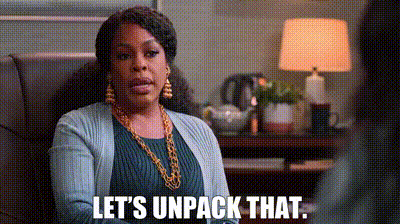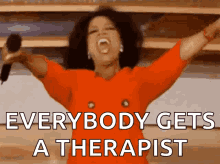How is coaching different from therapy? (Part 4)
When it comes to coaching, a lot of people ask, “Why wouldn’t I just go to therapy?” Are coaches just wanna be therapists? Are they giving the same service as therapists at a higher cost and without insurance? the distinction isn’t always clear, so let’s dive into it in this post!
Before we delve into the differences, let’s talk about what therapy is and how the service is given/received.
There are as many different therapy styles as there are therapists.
In quite broad terms, therapists are trained professionals whose job is to diagnose and treat mental illnesses. They usually have a Master’s degree and a clinical license. They use the DSM as their main diagnostic tool. Counselors use both their foundational education along continuing educational classes to learn and implement different modalities to treat mental illness.
It is a very valuable service and one people should use if they need it and can afford it!
I’ve been in the mental health field for a long time. I have hands-on experience working with many clinicians, and every therapist thinks about the work differently. Every therapist has different education, found out and implemented different modalities at different times, has different perspectives and political leanings, and has their own biases (which providers are often taught that our thoughts and opinions should be kept to ourselves and should not be shared with the client. But it’s impossible to be unbiased about anything, and everything is political.) All of these contribute to each therapist’s unique style on how to approach “the work. ”
Some therapists treat a diagnosis.
Some therapists are trying to fix you.
Some are trying to change what the therapeutic model speaks for and embrace a more humanistic perspective, rather than a medical one.
However, coaching is different work for multiple reasons.
If you look at a previous blog post where I explain the transformational coaching framework, you can see that the model is quite different from therapeutic intervention. We are not diagnosing anyone or treating mental health disorders. Transformational coaching does internal work, but it is not considered clinical work.
One of the biggest factors is that coaching operates outside of the system. Normally, we would think that this is a bad thing because of fewer regulations and standards for what coaching entails, and the lack of proper training and credentialing. However…
Our systems are very, very broken.
We often assume it’s a bad thing that coaching isn’t regulated the way therapy is.
And yes, the lack of standardization in coaching can be a problem —when people aren’t trained, don’t know their scope, or sell promises they can’t ethically keep.
But our systems are broken.
They are more centered on power, control, and wealth than on what is best for the people.
Many therapists are tired. They see 20-40 clients in one week and don’t get paid on time or have any benefits because the insurance companies don’t reimburse them right away (or at all). They constantly have to write more, justify more, attend this school meeting for free, go to court to testify against their client, police themselves into showing up a certain way unless their license is taken away. It's exhausting.
Regulations and standards are very important, and in an ideal world, I would agree and say that regulation is needed and should be enforced.
But in its current form, our institutions are set out to disempower both the providers and receivers of services. It is set up to serve the people who are making the most money (insurance and agency founders). This causes so many people to quit, burn out, or not show up in a way that actually helps people. It’s one of the reasons why clients feel they are spending so much money, sometimes get very poor service, and don’t get the help they need/want.
(There are also so many more reasons. I could get into insurance, agency CEO’s, the problems with the DSM and medical model, problems with the educational system, medical authority, state-sanctioned violence, etc., but we’d be here all day!)
I felt a lot of this on a deep level, and I wasn’t even a therapist!
That’s why I think coaching can be so powerful.
I want to be clear here, I’m not dissing on therapy. It is a very valuable service that should be used (especially if you’re in crisis or otherwise advised by a medical professional), but I think coaching has some great benefits, which we’ll get into now.
Coaching Lives Outside That System — and That’s the Point
Coaching can be incredibly freeing
It allows the work to be something that is actually tailored to the individual. I can self-disclose when it benefits you. There aren't strict rules about what we’re supposed to be doing or extensive paperwork to fill out after a session. We can really mold our sessions to what will be best for you.
When you book with me, you’re booking with someone who has the presence, energy, and time to really work with you. I’m not gonna be burnt out by having too many clients!
Coaching can (and should) be accessible to all if it’s what an individual needs. Which is why I offer everyone a 2-hour powerful conversation, so that anyone who feels like they want to reach me can.
It’s not like coaching is entirely outside of mental health practices either. My form of coaching also involved mental health coaching.
Wait.. What is the difference between mental health coaching and therapy?
Ah yes, another layer!
What the heck is the difference between therapy and mental health coaching?
Here's how I see it:
Therapy:
Diagnoses and treats mental health conditions
Guided by clinical training and ethical boundaries
Focused on healing mental illness, trauma, and crisis
Mental Health Coaching (the way I do it):
Does not treat diagnoses
Offers tools, practices, and accountability related to mental wellness and your internal world
Helps you implement techniques you may already be learning in therapy
Shares knowledge — not clinical intervention
Think of mental health coaching as someone who can create goals surrounding mental health issues, but is not treating a diagnosis. They help people develop self-management strategies to make sustainable life changes.
Think mindfulness, regulation strategies, and feeling more confident to take on internal challenges. Mental Health coaches share knowledge and tools for mental health strategies, but as a coach, not a therapist.
For example, I have a lot of knowledge about mental health techniques, and read a lot of books and research on trauma, healing, somatic experiencing, therapy techniques like CBT, DBT, ACT, etc., and can share them with you as someone who is just sharing knowledge, not treating a diagnosis. I can help you with coming up with strategies to navigate your life when you’re feeling down, but not specifically for a diagnosis like Major Depressive Disorder.
Alternatively, if you have both a therapist and a mental health coach, the coach can help you implement strategies outside of sessions. In this case, you learn techniques in therapy that I can help reinforce and keep you accountable.
Although quite different, you should make your own opinions on what coaching/therapy means for you and how you think about it!
Final thoughts
To recap:
Therapists diagnose and treat mental illness
Life coaches work on specific goals and help set direction, timeline, and accountablity
Transformational coaches help people change their inner worlds, learn about the “why” behind their actions, and help people align with their highest selves
Mental health coaches support internal and mental wellbeing by creating goals surrounding mental wellness and sharing positive mental health strategies.
(and some people are all 4 lol)
Therapy and coaching serve different purposes, and each has real value.
Therapy can hold space for crisis, trauma, and mental health conditions. Coaching can hold space for your becoming — the deeper "why" behind your patterns, the version of yourself you're trying to step into, and the stuckness you can’t shake even after years of self-awareness.
In the next and final blog, we’ll talk about who does benefit most from this kind of deep, root-level coaching!
This is from the series “Stuck Between Who You Had to Be & Who You Truly Are - Coaching Explained.” The first post is here if you want to start from the beginning.




